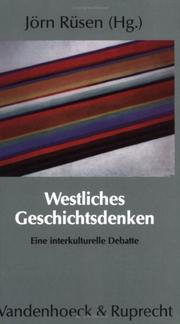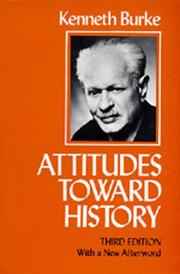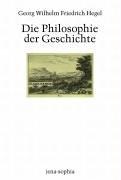
ISBN: 3525013795 9783525013793 Year: 1999 Publisher: Göttingen Vandenhoeck und Ruprecht
Abstract | Keywords | Export | Availability | Bookmark
 Loading...
Loading...Choose an application
- Reference Manager
- EndNote
- RefWorks (Direct export to RefWorks)
History --- Historiography --- Philosophy --- #A0507HI --- History - Philosophy
Book
ISBN: 2715710119 9782715710115 Year: 1980 Publisher: Paris Anthropos
Abstract | Keywords | Export | Availability | Bookmark
 Loading...
Loading...Choose an application
- Reference Manager
- EndNote
- RefWorks (Direct export to RefWorks)
History --- Philosophy --- History, Modern --- History - Philosophy

ISBN: 0520041488 9780520041486 Year: 1984 Volume: 469 Publisher: Berkeley University of California press
Abstract | Keywords | Export | Availability | Bookmark
 Loading...
Loading...Choose an application
- Reference Manager
- EndNote
- RefWorks (Direct export to RefWorks)
History --- Philosophy --- History, Modern --- History - Philosophy
Book
ISBN: 2908029049 9782908029048 Year: 1991 Publisher: Librairie du Savoir
Abstract | Keywords | Export | Availability | Bookmark
 Loading...
Loading...Choose an application
- Reference Manager
- EndNote
- RefWorks (Direct export to RefWorks)
History --- Philosophy --- History, Modern --- History - Philosophy
Book
ISBN: 9780253022660 0253022665 Year: 2016 Publisher: Bloomington Indiana University Press
Abstract | Keywords | Export | Availability | Bookmark
 Loading...
Loading...Choose an application
- Reference Manager
- EndNote
- RefWorks (Direct export to RefWorks)
Martin Heidegger's Nietzsche's Second Untimely Meditation presents crucial elements for understanding Heidegger's thinking from 1936 to 1940. Heidegger offers a radically different reading of a text that he had read decades earlier, showing how his relationship with Nietzche's has changed, as well as how his understandings of the differences between animals and humans, temporality and history, and the Western philosophical tradition developed. With his new reading, Heidegger delineates three Nietzschean modes of history, which should be understood as grounded in the structure of temporality or historicity and also offers a metaphysical determination of life and the essence of humankind. Ullrich Hasse and Mark Sinclair offer a clear and accessible translation despite the fragmentary and disjointed quality of the original lecture notes that comprise this text.
Metaphysics --- Philosophy, German --- History --- Philosophy --- History - Philosophy
Book
ISBN: 9780198755722 0198755724 0191816876 Year: 2016 Publisher: Oxford Oxford University Press
Abstract | Keywords | Export | Availability | Bookmark
 Loading...
Loading...Choose an application
- Reference Manager
- EndNote
- RefWorks (Direct export to RefWorks)
What makes up reality, and how? What kinds of entity are fundamental to reality, and how do dependent entities depend on the fundamental ones? How does one entity metaphysically ground another? These questions are central to contemporary metaphysics. The papers in this collection, written by a new generation of metaphysicians, address these and related questions. They investigate the metaphysical concepts of grounding and fundamentality, and the relationship between the fundamental and all the other parts of reality. Together, these papers represent the cutting-edge of a central topic in contemporary metaphysics.
Metaphysics --- Reality --- History --- Philosophy --- Metaphysics - History - Philosophy

ISBN: 3770540581 9783770540587 Year: 2005 Publisher: München Fink
Abstract | Keywords | Export | Availability | Bookmark
 Loading...
Loading...Choose an application
- Reference Manager
- EndNote
- RefWorks (Direct export to RefWorks)
Die mit einem Vorwort des Herausgebers versehene Heimann-Mitschrift von Hegels letzter Vorlesungsreihe über die Philosophie der Weltgeschichte (1830/31) wurde von Eduard Gans für seine Erstedition der Hegelschen Vorlesungen (1837) genutzt und ermöglicht somit den wichtigen Vergleich mit Gans’ Kompilation, die bisherigen Deutungen zugrunde liegt. Der in Budapest gefundene Text vermag einen neuen ›unzeitgemäßen‹ Blick auf Hegels Denken des menschlichen Geschehens in freiheitlicher, vernünftiger und weltbürgerlich-globaler Absicht zu öffnen, auf eine moderne Philosophie der Freiheit. Diese Mitschrift belegt die außerordentliche Relevanz des Gedankens der Freiheit als dem 'Angelpunkt der modernen Zeit' und verdeutlicht ein theoretisches Instrumentarium für die ›Fassung der Zeit in Gedanken‹, das einen Vergleich mit heutigen Konzepten nicht zu scheuen braucht.
History --- History, Modern --- Philosophy --- History - Philosophy
Book
ISBN: 9781647120863 Year: 2021 Publisher: Washington : Georgetown University Press,
Abstract | Keywords | Export | Availability | Bookmark
 Loading...
Loading...Choose an application
- Reference Manager
- EndNote
- RefWorks (Direct export to RefWorks)
Francis Fukuyama is one of the most significant political theorists of the past thirty years. Bursting into public awareness in 1989 with his provocative thesis about 'the end of history', Fukuyama has made fascinating contributions to a wide range of subjects - the importance of trust in societies, the potential dangers of biotechnology, the development of political authority and the modern state, and most recently, the role of identity in politics. This book records a series of conversations with Fukuyama in which he discusses his background and its role in shaping his thinking, the context and genesis of his major works, and his thoughts in light of the dramatic developments of the past decade, especially the rise of populism around the world. The result is a fascinating picture of a major intellectual. The book both provides an overview of Fukuyama's thought and reveals new insights into his best-known work. This book also allows readers to trace the themes which have animated Fukuyama's entire intellectual career.
FUKUYAMA, FRANCIS--INTERVIEWS --- HISTORY--PHILOSOPHY --- WORLD POLITICS
Book

ISBN: 3110701871 3110701839 Year: 2021 Publisher: Berlin ; Boston : De Gruyter,
Abstract | Keywords | Export | Availability | Bookmark
 Loading...
Loading...Choose an application
- Reference Manager
- EndNote
- RefWorks (Direct export to RefWorks)
Beim Atmen - im Prozess von ständigem Austausch und Grenzüberschreitung zwischen Organismus und Umwelt - wird Luft als «immaterielles» Material aktiv. Der Band versammelt erstmals Studien zum Atem aus Perspektive der Künste, Geisteswissenschaften sowie experimentellen wissenschaftlichen und gestalterischen Praktiken. Mit Fokus auf die Zeit von 1900 bis heute umfasst die Publikation bewusst eine Epoche, in welcher Luft ein prekäres Medium ist: Ob im Kontext von Klimawandel und globaler Pandemie, Raumfahrttechnologien oder im Giftgaskrieg - Luft ist von Menschen miterzeugt und manipuliert. In diesem Spektrum zeigt sich der Atem selbst als schwer zu fassende, aber wesentliche Substanz, die Verbindungen zwischen Physischem, Symbolischem, Technologischem und Sozialem sichtbar macht During breathing - in the process of constant exchange and crossing of boundaries between the organism and its environment - air as an «immaterial» material becomes active. For the first time, this anthology brings together studies on breath from the perspective of the arts and humanities, as well as experimental scientific and design practices. Focusing on the period from 1900 to the present day, the publication covers an era during which air has become a precarious medium: whether in the context of climate change or global pandemic, space technology or gas warfare, air is now co-created and manipulated by humans. Against this backdrop, breath appears as an elusive yet vital substance that reveals the interconnections between the physical, symbolic, technological and social realms.
Digital
Abstract | Keywords | Export | Availability | Bookmark
 Loading...
Loading...Choose an application
- Reference Manager
- EndNote
- RefWorks (Direct export to RefWorks)
Political science --- History -- Philosophy --- Law -- Philosophy

 Search
Search Feedback
Feedback About UniCat
About UniCat  Help
Help News
News